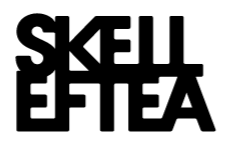Cleantech
Why everyone is talking about clean tech
Next summer, Skellefteå will host an international conference on cleantech. It's a term that's cropping up more and more often when sustainable industry, growth and the future are mentioned. But what is cleantech and why is everyone talking about it? Well, because it could be the solution to today's environmental problems. And Skellefteå has an important role to play.
- Simply put, cleantech is all about green technology, clean energy and sustainable solutions, and that environmental relevance should be the driving force when doing business," says Susanne Lindström.
She is project manager for North Sweden Cleantech, an innovation and export platform that works to profile Västerbotten and Örnsköldsvik as a force to be reckoned with when it comes to developing products, services and research linked to cleantech. Today, around 80 companies in the region are linked to the platform, which helps companies to increase external interest in them.
World-leading research
There are plenty of good examples, not least in the Skellefteå region, where companies such as Martinsons, Skellefteå Kraft, Node Pole, Eco-Oil and Northvolt are at the forefront of their respective industries' sustainability work.
- This region is a world leader in research into bio-based materials. Everything you can make from oil can be made from wood,' says Susanne Lindström, listing everything from clothing to aviation fuel.
With that insight, it's easy to understand the role biomaterials can play in society's transition away from fossil-fuel dependence. And that's what it's all about - making the world more sustainable in a cost-effective way and creating better alternatives to conventional methods. That's why even a mining company like Boliden can be classed as a cleantech company. In addition to the company's vaunted ability to recycle electronic scrap, Boliden is working hard to improve the environmental performance of all its processes. But cleantech can also be about digital solutions - for example, an app that makes it easier to carpool.
Strong arguments
According to Susanne Lindström, there is a lot to be said for the clean energy and green solutions being generated in northern Sweden making a big difference in tackling today's climate problems. The arguments are there. We have a highly educated population, there are four universities in the region, we are top-ranked in innovation and a world leader in metal recycling, to name but a few.
The location itself is also a huge asset, with a surplus of renewable energy from hydro, solar and wind power, and it is very cheap by global standards.
- Few of us probably think about the environmental impact of hanging out on Facebook, Amazon, YouTube and the like, but the consumption of energy among these giants is huge and there's no sign of it slowing down. Quite the contrary. The concern is that data halls are often located in places where they are powered by electricity from coal, says Susanne Lindström, who believes that companies will be forced to rethink when consumers realise this.
And then their eyes will turn to northern Sweden. Facebook already has a gigantic data hall in Luleå and the company Node Pole is working hard to set up more of these.
Flexibility is a barrier
But there are also challenges. Northern Sweden is sparsely populated and relatively invisible in both a global and national perspective. This makes it more difficult to attract investors and secure the supply of skills. In addition, we are not world leaders in highlighting our strengths.
- We are good at many things, but we are rather modest and need to be better at sticking our necks out. Skellefteå has been an exception. Skellefteå hasn't been shy and that was evident during the battle for Northvolt's establishment. An important factor there was also that it was done together with other players in the region and had the people of Skellefteå with it. Cooperation is the key," says Susanne Lindström.
A start-up global player
Which brings us back to the international conference scheduled to take place in Skellefteå in June 2019. At the moment it goes under the working title Future Industries Meet Up 2018 - Energy Edition. It will focus on energy, bioeconomy and smart cities.
- It will be an important effort to seriously position the region globally as a strong player when it comes to developing sustainable solutions for the future. We have so much knowledge and innovative power and everyone should know that," says Susanne Lindström.
And here are some examples of cleantech from the region:
Corn makes beer makers greener
The Skellefteå company Envigas produces biochar, bio-oil and synthetic gas from biomass. In our region, this means that forest waste becomes fuel of various kinds, but globally, agricultural residues are much more common. In Mexico, one of the world's biggest corn producers, the residues are currently burned - but soon farmers there could be paid for the waste, which is then converted into gas. In fact, beer manufacturer Heineken has shown great interest in using that gas for its production in a bid to become more environmentally friendly.
Cellulose becomes fashion
Domsjö fabriker manufactures a highly processed cellulose grade from spruce that in a further step becomes viscose. As a customer, you will find it in silk-like fashion garments.
Forest becomes aviation fuel
Within ten years, Swedish domestic aviation could be flying on green fuel from forest residues after researchers from Luleå University of Technology found a solution. A pilot project now being planned can be carried out at LTU Green Fuels' facility in Piteå and it should provide enough fuel to carry out commercial domestic flights.
Zero Sun Project
Skellefteå Kraft is currently building a house on Vitberget that will be powered by solar energy, despite the fact that the sun is absent for much of the year in our latitudes. The villa has a unique energy system that combines solar cells, batteries, electrolysis, geothermal energy, hydrogen and fuel cells. This allows the villa to store solar energy during the light seasons, and then use the surplus during the dark ones. The house is expected to be completed in June 2018, when it will be available for public rental.
Smarter travel
Umeå-based company SpaceTime has developed a cloud-based service that allows users to book the smartest travel option from one destination to another by listing all possible ways to travel, including public transport, cost, carbon emissions and calorie burn. The aim is for organisations to optimise their travel while saving money and reducing their environmental impact.
Sidinformation
- Senast uppdaterad:
- 2 March 2023

